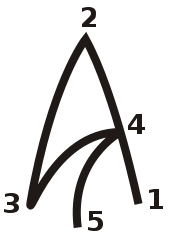Talk:Yus: Difference between revisions
Reverted 2 edits by 187.63.32.34 (talk) |
→Split suggestion: new section |
||
| Line 34: | Line 34: | ||
The article switches from a non-capitalised spelling to a capitalised one. Should letter names be capitalised or not? [[User:1234qwer1234qwer4|1234qwer1234qwer4]] ([[User talk:1234qwer1234qwer4|talk]]) 14:57, 23 February 2020 (UTC) |
The article switches from a non-capitalised spelling to a capitalised one. Should letter names be capitalised or not? [[User:1234qwer1234qwer4|1234qwer1234qwer4]] ([[User talk:1234qwer1234qwer4|talk]]) 14:57, 23 February 2020 (UTC) |
||
== Split suggestion == |
|||
I think there should be separate pages for Little Yus and Big Yus. [[Special:Contributions/2601:C6:D281:6710:588B:AEC:87AE:82CE|2601:C6:D281:6710:588B:AEC:87AE:82CE]] ([[User talk:2601:C6:D281:6710:588B:AEC:87AE:82CE|talk]]) 00:40, 1 August 2023 (UTC) |
|||
Revision as of 00:40, 1 August 2023
| Writing systems Start‑class Low‑importance | ||||||||||
| ||||||||||
| Russia: Language & literature / History Start‑class Mid‑importance | ||||||||||||||||
| ||||||||||||||||
Template:IPA
Ogneslav, be careful in (mis)using Template:IPA to display old Cyrillic characters. The list of fonts chosen for that template are guaranteed to include IPA characters, but not any particular other ones. Even if it makes it look right in your system, it may mess up the display for someone else who has a different set of fonts installed. —Michael Z. 2005-01-22 16:54 Z
Ommiting 'n'
This part: "for example, раньше might be realized as райше, or станет as стает" sounds like an original research since as a native Russian speaker I haven't heard such variants. Moreover, there are words with nasalization, for example понял can be pronounced as по:л with a nasalized o. 77.40.36.13 (talk) 15:58, 4 June 2012 (UTC)
Nice article anyway ...
Small, but good. FWIW, I found a nice older Russian lyrics which shows the use of the Yus in the Russian language at the end of the 19th century. Znamenny Chant. -andy 92.227.17.160 (talk) 02:07, 16 July 2008 (UTC)
Meaning of this
It says here "There are some Bulgarian or Macedonian dialects around Thessaloniki and Kastoria in Northern Greece which still keep nasal pronunciation: КъНде греНдеш, мило чеНдо?". What is the Cyrillic text at the end supposed to say? What does it have to do with yus or nasal vowels? And why are its Нs all capitalized? 71.90.130.7 (talk) 05:12, 23 October 2008 (UTC)
- It says: "Where do you go, dear child?" in Solun dialect. The capital Н expresses the nasalism. In this text we have 1 Big Yus (the first word) and 2 Little Yuses (the 2nd and 4th words). "Кѫде грѧдѣшъ, мило чѧдо?" is a spelling from Middle Bulgarian.--Lantonov (talk) 14:49, 4 November 2008 (UTC)
- So is that an actual old spelling, and if so, from what period? Is there a reference? What is the modern spelling?
- The second spelling is better: /kə̃de grẽdeʃ milo tʃẽdo/? For a text in Solun dialect see s:bg:Дописка от село Висока. It is from 1863. The actual spelling is preserved in this text. Little Yus is not used and is substituted with -ен: ченда-та, напрендватъ, глендатъ, ензикъ, грендѣлъ. Big Yus is used. However, it has lost nasalism in many words, and where the nasalism is preserved, it is written ѫн: пѫнтъ-тъ, рѫнка, пѫнтоващемъ, Лѫнгандина. This dialect existed until the Balkan Wars (1913). Other dialects using nasal vowels are Korca dialect in Albania and Kostur (Kastoria) dialect in Greece, Bulgarian dialects which existed sometime until the end of 19th century. --Lantonov (talk) 15:38, 4 November 2008 (UTC)
Handwritten Ѧ and how it became Я

--Юе Артеміс (talk) 19:07, 30 June 2010 (UTC)
Other yus letters are blended yus (Ꙛ ꙛ), closed little yus (Ꙙ ꙙ)
When were them used and which sounds did they represent? Do ISO 9 transliterations exist for them? --62.224.160.232 (talk) 10:30, 12 August 2016 (UTC)
- See here (p. 4).--Lüboslóv Yęzýkin (talk) 13:24, 12 August 2016 (UTC)
Capitalisation
The article switches from a non-capitalised spelling to a capitalised one. Should letter names be capitalised or not? 1234qwer1234qwer4 (talk) 14:57, 23 February 2020 (UTC)
Split suggestion
I think there should be separate pages for Little Yus and Big Yus. 2601:C6:D281:6710:588B:AEC:87AE:82CE (talk) 00:40, 1 August 2023 (UTC)
- Start-Class Writing system articles
- Low-importance Writing system articles
- Start-Class Russia articles
- Mid-importance Russia articles
- Mid-importance Start-Class Russia articles
- Start-Class Russia (language and literature) articles
- Language and literature of Russia task force articles
- Start-Class Russia (history) articles
- History of Russia task force articles
- WikiProject Russia articles




